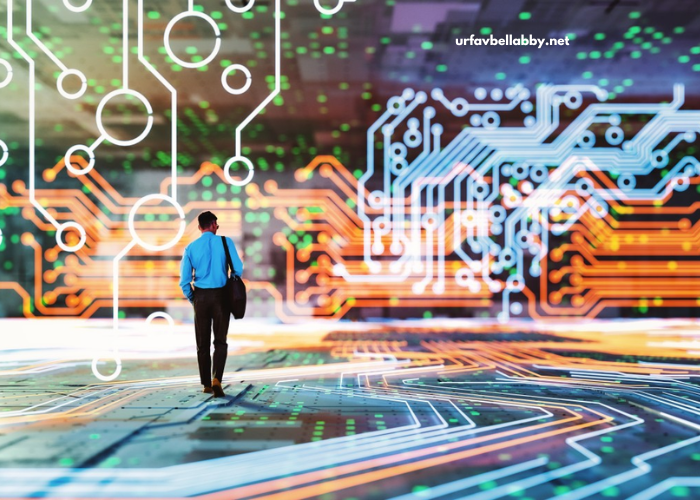Technology has always been a driving force in the evolution of industries, but in recent years, its impact has become more profound, transformative, and visible than ever before. From healthcare to manufacturing, education to entertainment, technology is reshaping the way businesses operate and industries function. The fusion of new innovations with traditional practices has given rise to a new era of efficiency, productivity, and global connectivity. This article delves into how technology is revolutionizing modern industries, with a focus on the key trends, advancements, and impacts across various sectors.
The Impact of Technology on Industry Sectors
1. Healthcare Industry
Technology has revolutionized the healthcare industry, making it more efficient, accessible, and personalized. From telemedicine to robotic surgeries, the integration of technology into healthcare has improved patient outcomes and transformed medical practices.
Telemedicine and Remote Patient Monitoring
Telemedicine has bridged the gap between patients and healthcare providers, especially in remote areas or during pandemics like COVID-19. Through video consultations, wearable devices, and remote monitoring tools, patients can now receive timely care from the comfort of their homes. This reduces the strain on hospitals and healthcare systems, improving overall healthcare accessibility.
AI and Machine Learning in Diagnostics
Artificial intelligence (AI) is playing a pivotal role in diagnostics, where machine learning algorithms analyze vast amounts of medical data to detect patterns and predict health conditions. For example, AI systems are now able to read medical images, such as MRIs or CT scans, with accuracy comparable to human experts, speeding up diagnosis and treatment plans.
Robotics and Surgery
Surgical robotics is enhancing precision in complex procedures, enabling minimally invasive surgeries that reduce recovery time and improve patient outcomes. Technologies like robotic-assisted surgery systems, such as the da Vinci Surgical System, allow for greater control and accuracy, reducing the risk of human error.
2. Manufacturing and Automation
The manufacturing industry has seen a massive transformation through technology. Automation, robotics, and the Internet of Things (IoT) have improved production lines, supply chains, and quality control processes.
Industrial Automation
Automation is at the heart of modern manufacturing, driving efficiency and productivity. Robots are increasingly handling repetitive tasks, allowing human workers to focus on more complex duties. These systems reduce labor costs, improve safety, and maintain consistent product quality. The introduction of AI in automation has further enhanced adaptability and decision-making.
Internet of Things (IoT) in Manufacturing
The IoT enables machines, sensors, and devices to connect and communicate with each other, providing real-time data and insights. This interconnectedness allows manufacturers to track production performance, predict maintenance needs, and optimize energy consumption. IoT-driven smart factories are now capable of running 24/7 with minimal downtime.
3D Printing
3D printing, or additive manufacturing, is also revolutionizing the production process. It enables rapid prototyping, cost-effective small-batch production, and even the creation of complex, custom parts. Companies are now able to streamline their design and manufacturing processes by 3D printing components on-demand, saving time and reducing waste.
3. Retail Industry
The retail sector has seen a massive shift due to the growth of e-commerce, digital payment systems, and customer personalization technologies. Today’s consumers demand a seamless, personalized shopping experience, and businesses are leveraging technology to meet these needs.
E-commerce and Mobile Shopping
Online shopping has become a cornerstone of modern retail. With advancements in payment processing, shipping logistics, and customer support systems, consumers can now shop for almost anything from anywhere at any time. Mobile apps, chatbots, and AI-powered recommendations make it easier for customers to find products that match their preferences, further enhancing the shopping experience.
Augmented Reality (AR) in Retail
Augmented reality (AR) technology is changing how consumers interact with products. Retailers are incorporating AR into their apps and websites, allowing customers to virtually try on clothes, see how furniture fits in their homes, or test out beauty products before purchasing. AR creates an immersive experience that boosts engagement and enhances decision-making.
AI and Personalized Marketing
AI and machine learning are enabling retailers to offer hyper-personalized experiences. By analyzing consumer behavior, businesses can provide tailored recommendations, discounts, and promotions. Personalized marketing not only improves customer satisfaction but also increases conversion rates, making it an essential tool for modern retail strategies.
4. Finance and Banking
The financial industry has undergone significant changes with the adoption of new technologies. From digital banking and blockchain to AI and cybersecurity, technology is shaping the future of finance.
Blockchain and Cryptocurrencies
Blockchain technology has introduced a decentralized and transparent way of recording transactions. Cryptocurrencies like Bitcoin and Ethereum are now gaining traction as an alternative form of currency, challenging traditional banking systems. Blockchain is also being used for secure and efficient cross-border payments, reducing transaction costs and processing times.
Fintech and Digital Banking
Fintech startups have disrupted traditional banking by offering digital-first services, such as mobile wallets, peer-to-peer lending, and online investment platforms. Digital banks have emerged, offering a range of services like savings accounts, loans, and wealth management through user-friendly mobile applications. This shift has made financial services more accessible and convenient.
AI in Fraud Detection
Artificial intelligence is playing a critical role in detecting fraudulent activities in the finance sector. Machine learning algorithms can analyze transaction patterns and identify anomalies in real-time, preventing potential fraud before it occurs. This technology is crucial in ensuring security and maintaining consumer trust in digital banking platforms.
5. Education and E-Learning
Technology has transformed education, providing new learning tools, platforms, and resources that make education more flexible, accessible, and engaging.
E-Learning Platforms and Online Education
The rise of e-learning platforms like Coursera, Udemy, and Khan Academy has democratized education. Students can now access courses from top universities and instructors from around the world, allowing them to learn at their own pace and convenience. This shift has opened up opportunities for people of all ages to acquire new skills and knowledge without geographical constraints.
Virtual Classrooms and Collaboration Tools
Virtual classrooms have become a mainstay, especially following the COVID-19 pandemic. Video conferencing tools like Zoom and Microsoft Teams enable real-time interaction between students and teachers, regardless of location. Collaborative tools such as Google Classroom and Slack have further enhanced communication and teamwork among students, making education more interactive.
AI-Powered Education Tools
AI is transforming personalized learning, with adaptive learning platforms tailoring lessons and content to individual student needs. These platforms analyze a student’s learning patterns and provide customized feedback, helping learners progress at their own pace. AI-based tutors and chatbots also provide instant support, improving the overall learning experience.
6. Transportation and Logistics
The transportation and logistics industries are benefiting greatly from technological innovations, improving efficiency, sustainability, and safety.
Self-Driving Vehicles
Autonomous vehicles, including self-driving cars and trucks, are set to revolutionize the transportation sector. These vehicles use AI, sensors, and machine learning to navigate and make decisions, reducing human error and increasing safety. In the logistics industry, autonomous trucks are being tested for freight transport, which could lower costs and reduce traffic congestion.
Electric Vehicles (EVs) and Sustainability
The transition to electric vehicles (EVs) is gaining momentum as a response to environmental concerns and the need for sustainable transportation. Advances in battery technology are making EVs more efficient and affordable, while governments around the world are providing incentives to encourage adoption. EVs have the potential to reduce carbon emissions significantly, contributing to the global fight against climate change.
Supply Chain Optimization
Technology has improved the efficiency of supply chains through automation, real-time tracking, and data analytics. IoT devices enable companies to monitor inventory and shipments in real-time, ensuring that products are delivered on time and at the right location. AI and predictive analytics also help in forecasting demand, optimizing routes, and reducing waste in logistics operations.
7. Energy Industry
The energy industry is undergoing a transformation as technology enables more efficient, renewable, and sustainable energy production and consumption.
Renewable Energy Technologies
Advancements in solar, wind, and hydropower technologies are making renewable energy more viable and cost-effective. Solar panels, wind turbines, and other renewable sources are becoming more efficient, helping to reduce dependence on fossil fuels and curb carbon emissions.
Smart Grids and Energy Storage
Smart grids are revolutionizing the way electricity is distributed and consumed. These grids use sensors and communication technologies to monitor and manage energy use in real time, improving efficiency and reducing waste. Additionally, innovations in energy storage, such as advanced batteries, allow for the more effective use of renewable energy sources, which are often intermittent.
Energy Management Systems
AI and IoT technologies are helping businesses and individuals optimize energy consumption. Energy management systems can analyze usage patterns, predict future energy needs, and recommend ways to reduce waste. These systems not only lower energy bills but also contribute to sustainability goals.
Conclusion
Technology is undeniably revolutionizing modern industries, bringing about unprecedented changes that are reshaping how businesses operate and how industries function. From healthcare and education to manufacturing, finance, and energy, every sector is benefiting from the innovation and efficiency that technology offers. As these advancements continue to evolve, industries will adapt, and new opportunities will emerge, driving further progress and transformation across the global economy. Embracing technological change is no longer optional—it is a necessity for companies and industries that wish to remain competitive and relevant in an increasingly digital world.





